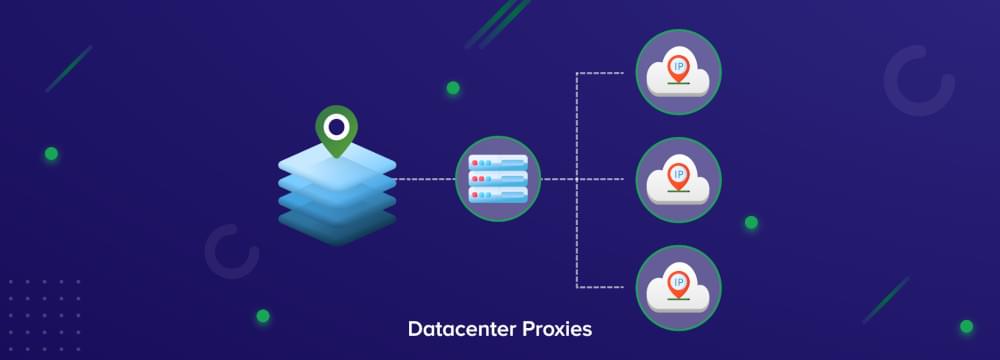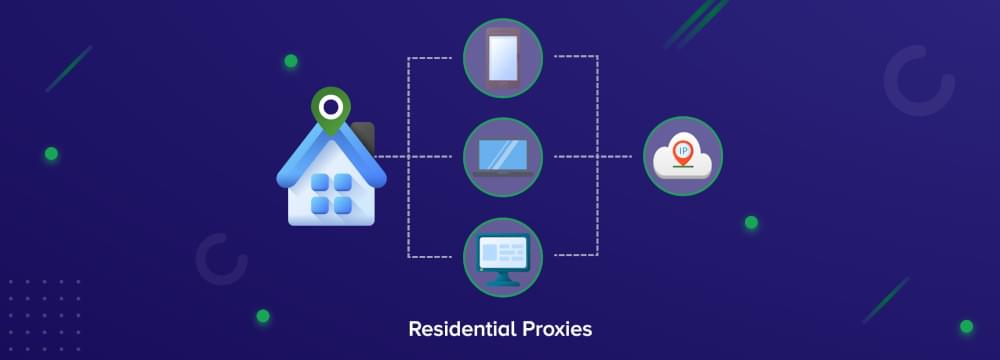Datacenter proxies are IP addresses from third-party server farms that offer fast speeds (sub-100ms response times) and low costs ($0.10-$1 per IP) but are easily detected by websites. Residential proxies use real ISP-assigned IP addresses from homes, providing superior anonymity and 99% lower detection rates but cost 5-10x more and operate 20-30% slower.
- Choose datacenter proxies for: High-speed data collection, social media automation, price monitoring.
- Choose residential proxies for: Web scraping protected sites, geo-restricted content access, market research.
Datacenter Proxy

What are Datacenter Proxies?
Datacenter proxies are IP addresses hosted on servers in commercial data centers, completely independent of Internet Service Providers (ISPs).
How Datacenter Proxies Work
When you connect through a datacenter proxy, your request follows this path:
- Your device sends a request to the datacenter proxy server
- The proxy masks your real IP with a datacenter IP address
- The target website receives the request from the datacenter IP
- Response data returns through the same masked connection to effectively unblock websites
Types of Datacenter Proxies
HTTP Proxies
- Function: Handle web traffic exclusively using HTTP/HTTPS protocols
- Best for: Web scraping, browser automation, API requests
- Security level: Basic encryption through HTTPS connections
SOCKS Proxies
- Function: Route any type of internet traffic at the socket level
- Best for: Email clients, gaming, P2P applications, non-HTTP protocols
- Security level: Protocol-agnostic with optional authentication
Datacenter Proxy Advantages
- Speed: Average response time of 50-100ms due to high-speed server connections
- Cost: Typically $0.10-$1.00 per IP address monthly
- Reliability: 99.9% uptime from professional data centers
- Scalability: Easy to obtain thousands of IPs instantly
Datacenter Proxy Disadvantages
- Detection: Easily identified through ASN (Autonomous System Number) analysis
- Blocking: Higher chance of IP blacklisting by protected websites
- Geographic limitations: Available only where data centers exist
- Shared subnets: Multiple IPs often share similar ranges, increasing detection risk
What Are Residential Proxies?

Residential proxies are legitimate IP addresses assigned by Internet Service Providers (ISPs) to real homes and businesses.
How Residential Proxies Work
Residential proxies operate through a more complex routing system:
- Your request connects to a residential proxy gateway
- The gateway routes traffic through a real residential device
- The residential device forwards your request using its genuine ISP-assigned IP
- Target websites see traffic from what appears to be a regular home user
Residential Proxy Advantages
- Authenticity: Indistinguishable from regular home internet users
- Low detection rate: Less than 1% blocking rate on most websites
- Geographic coverage: Available in 190+ countries through real ISP networks
- IP rotation: Automatic rotation through millions of residential IPs
- High success rate: 95%+ success rate for accessing protected content
We have compliled a list of best residential proxies and top rotating residential proxies(Free and Paid) for you. Check them out to learn deeply which suits your needs.
Mainly, residential proxies cover more geo-locations. So, if you’re hoping to get to content in a particular location, first see whether the proxies you’re interested in cover that area. In any case, datacenter proxies’ function if you cover your impression.
When to Use Each Type of Proxy
Use Datacenter Proxies When:
High-Speed Data Collection
- Scenario: Scraping product prices from e-commerce sites
- Why datacenter: Sub-100ms response times enable processing thousands of pages hourly
- Example: Monitoring competitor pricing across 10,000+ products daily
Social Media Automation
- Scenario: Managing multiple social media accounts
- Why datacenter: Fast posting, commenting, and engagement activities
- Limitation: May face account restrictions if detected
API Testing and Development
- Scenario: Testing applications with different IP addresses
- Why datacenter: Reliable, fast connections for development environments
- Benefit: Predictable performance for consistent testing
Use Residential Proxies When:
Web Scraping Protected Sites
- Scenario: Extracting data from sites with strong anti-bot measures
- Why residential: 99% lower detection rate bypasses sophisticated blocking
- Example: Scraping Google search results, social media data, or financial sites
Accessing Geo-Restricted Content
- Scenario: Viewing content limited to specific countries
- Why residential: Genuine ISP IPs appear as real local users
- Use case: Market research, content verification, compliance testing
Ad Verification and Brand Protection
- Scenario: Monitoring how ads appear in different regions
- Why residential: Authentic geographic presence shows real user experience
- Benefit: Accurate representation of actual ad delivery.
Differences between Datacenter and Residential Proxies
| Datacenter Proxies | VS | Residential Proxies |
|---|---|---|
| Cheaper (sometimes free) to obtain | VS | Expensive to obtain |
| Fast in terms of speed | VS | Slower, but static ones are as fast as Datacenter proxies |
| Generally regarded to provide basic anonymity and are not that secure for the average user | VS | Secure and provide high-level of anonymity |
| Most Datacenter proxies have been previously used at some point | VS | Residential IPs are unique and can |
The main difference between Datacenter Proxies and Residential Proxies is that Datacenter proxies are easily available, are cheaper, fast but provide only basic anonymity and have been previously used while Residential IPs are more secure, provide high level of anonymity but can be expensive and slower than data center proxies(as they provide more IP addresses).
You may now decide which proxy is the best for your application accordingly.
Conclusion
To sum up, both residential and datacenter proxies can be useful depending on your application and experience, and that both have advantages over the other. Both of them serve the sole purpose of hiding your identity on the web. Working around proxy servers can be challenging, especially when you need to get things done on time. Every site has its own set of rules like traffic limits, access time limit per visitor, one single client per IP address, and a lot more, which every user needs to follow.
Crawlbase offers a Smart backconnect proxy API, which does not require a separate proxy list and lets you use our entire IP pool through a single address. API means you don’t have to start from scratch to fulfil your needs but speed-up your process by eliminating it. In addition to that, you do not need to care about proxies, their speed, bandwidth, quantity of IPs, datacenter or residential, bandwidth, whether they are blocked or not as we handle all that for you.
Ready to get started? Sign up on Crawlbase now!
Frequently Asked Questions (FAQs)
Which proxy type is better for web scraping?
Residential proxies are better for scraping protected or sophisticated websites due to their 95%+ success rates. Datacenter proxies work well for simple sites and high-speed requirements, but face higher blocking rates (30-50%) on protected sites.
Can websites detect datacenter proxies?
Yes, websites can easily detect datacenter proxies by analyzing the ASN (Autonomous System Number) and subnet ranges. Datacenter IPs are not assigned to residential ISPs, making them identifiable through IP intelligence databases.
Are residential proxies legal to use?
Residential proxies are legal when used for legitimate purposes like market research, brand protection, and public data collection. However, users must ensure compliance with website terms of service and local regulations.
How many IPs do I need for web scraping?
For datacenter proxies, use 1 IP per 100-500 requests daily. For residential proxies, rotation through thousands of IPs is automatic. Start with 10-20 datacenter IPs or 5-10GB residential data monthly for moderate scraping.
Which proxy type is more anonymous?
Residential proxies provide superior anonymity because they use legitimate ISP-assigned IPs indistinguishable from real users. Datacenter proxies offer basic anonymity by hiding your real IP but are easily identified as proxy traffic.
Can I use both proxy types together?
Yes, hybrid approaches work well. Use datacenter proxies for speed-critical, low-security tasks and residential proxies for accessing protected content. Some providers offer smart routing that automatically selects the best proxy type for each request.
What’s the difference in setup complexity?
Datacenter proxies require a simple IP Port configuration. Residential proxies often use gateway endpoints with automatic IP rotation, requiring less manual IP management but more complex authentication systems.
Which proxy type has better customer support?
Both types typically offer similar support levels from reputable providers. Residential proxy providers may offer more guidance due to the complexity of their systems, while datacenter providers focus on technical reliability.











